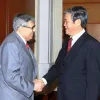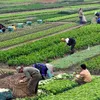Conference highlights positive influence of TPP on industrial exports
Participants at the event claimed the TPP would have a positive influence on the export of Vietnamese industrial products.
The car industry suffers from a low localisation rate, making it very difficult to compete when the taxes on cars from other ASEAN and ASEAN plus countries will drop to 0 and 5% in 2018. However, it’s a different story for Vietnam with the Trans-Pacific Partnership (TPP). Car components manufactured in Vietnam with the localisation rate of 45% or above will enjoy 0% tariffs in TPP member market.
"The TPP provides a lot of opportunities for Vietnamese companies to participate in the global supply chain. We can also import car components from the TPP members at lower prices, which will lower car production costs", said Nguyen Van Quy, Director of External Affairs Media, General Motors Vietnam.
That’s just one of the many opportunities from the TPP that are identified by the car manufacturing industry. At the forum, many experts also said that participating in the TPP would be an opportunity for businesses to expand their supply chain.
"Vietnam’s 90 million population is already a sufficiently large market for our industrial products. However, with the TPP we’ll have the chance to participate in a market of hundreds of millions of people that have higher incomes. This is an advantage for Vietnamese industrial products. We can also expand our production which will lead to lower costs", said Nguyen Quang Thai, Vice Chairman, Vietnam Economic Association.
However, to take advantage of these opportunities, Vietnamese firms need to abide TPP rules. They will also need a long preparatory process, especially in terms of human resources. Most Vietnamese businesses are small and medium-sized which means they can’t compete with foreign firms in term of capital, experience or technology.
"Human resources will be one of the deciding factors in Vietnam’s success in economic integration. However to have a good workforce, we must focus on training. Businesses themselves need to be proactive in improving the quality of their staff from managers, to technical staff and the wider workforce. They can need to be able to respond to changes in markets and consumer demand", said Nguyen Quang Thai.
Processed industrial products accounted for 78.8% of total export turnover last year. Therefore, taking advantage of the TPP to achieve sustainable export growth for these products will play a crucial role in maintaining the overall sustainability of the country’s export sector.
Tags:





